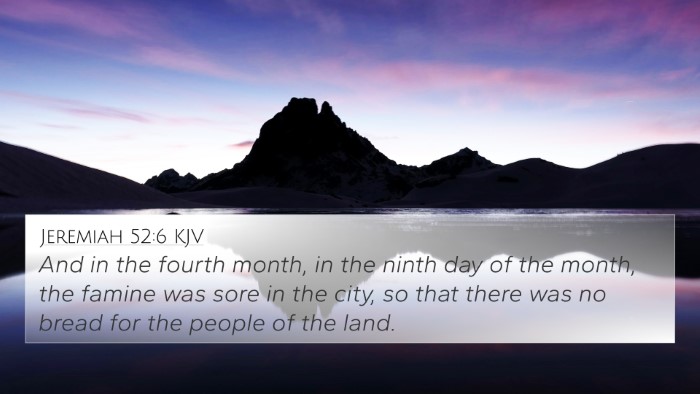Understanding 2 Kings 6:25
Verse Context: 2 Kings 6:25 states, "And there was a great famine in Samaria; and behold, they besieged it until an ass's head was sold for fourscore pieces of silver, and the fourth part of a cab of dove's dung for five pieces of silver." This verse highlights a period of desperate famine during the siege of Samaria by the Arameans, illustrating the extreme conditions faced by the people of Israel.
Summary of Interpretations
This verse is significant not only for its historical context but also for its theological implications, offering profound insights into the consequences of sin and the severity of divine judgment. Below, we explore insights from several public domain commentaries.
Matthew Henry's Commentary:
Matthew Henry emphasizes the severity of the famine as a result of God's judgment due to the idolatry and sins of Israel. He notes that the high price for an ass's head—a symbol of degradation—illustrates the desperate state of the people who once thrived. Henry connects this to the broader themes of societal decay and the consequences of turning away from God's commandments.
Albert Barnes' Notes:
Albert Barnes elaborates on the economic implications of the famine. He points out that the selling of "an ass's head" for such exorbitant prices reflects not just physical hunger, but a breakdown of societal structures. Barnes also notes that the reference to "dove's dung" indicates the desperation of the populace as they turn to the most unclean and undesirable sources of sustenance, highlighting their utter hopelessness and loss of dignity.
Adam Clarke's Commentary:
Adam Clarke provides a cultural perspective, explaining the significance of the items mentioned in the verse. He notes that an ass’s head was considered unclean in Jewish law and hence, symbolically represents the utter despair and moral decline of Israel during the siege. He further stresses that this situation serves as a cautionary tale about the consequences of a nation straying from God’s laws.
Cross-References to 2 Kings 6:25
- Deuteronomy 28:52-53: This passage forecasts sieges and consequent famine as a consequence of disobedience to God's commandments, paralleling the conditions faced in Samaria.
- 2 Kings 25:3: This verse describes a similar situation during the fall of Jerusalem, reinforcing the theme of judgment through famine.
- Lamentations 4:9: Here, the suffering and desperate hunger experienced by the people under siege is echoed, aligning with the despair in Samaria.
- Luke 16:19-31: In the parable of the rich man and Lazarus, the themes of desperation and the biblical views of wealth are explored, linking back to the pricing of unclean food.
- Matthew 24:7: This verse indicates that famines will occur during tribulations, possibly reflecting the same spiritual neglect that led to the events in 2 Kings.
- Isaiah 9:20: This passage discusses societal breakdown and self-destruction, linking to the consequences of a nation in rebellion against God.
- James 5:1-2: This New Testament warning about the fate of the rich parallels the social decay and desperation shown in 2 Kings 6:25.
- Hosea 4:6: God's people perish for lack of knowledge, illuminating the spiritual blindness that results in societal collapse reflected in Samaria.
- Matthew 6:25: The call not to worry about material provisions resonates with the desperate attempts to procure food reflected in the verses.
- Revelation 6:8: This verse discusses famine in the end times, drawing thematic parallels to prophetic warnings evident in 2 Kings.
Thematic Connections
The situation depicted in 2 Kings 6:25 serves as a stark reminder of the biblical principle that turning away from God will lead to hardship and suffering. The narrative reflects on the themes of judgment, desperation, and hope. Cross-referencing biblical texts shows how these themes are interwoven throughout scripture.
Insights from Cross-Referencing
Engaging in a comparative Bible verse analysis, one can identify connections between the Old and New Testaments, as well as cross-references that deepen understanding. Tools for Bible cross-referencing can enhance the study experience:
- Bible Concordance: Finding key themes and words throughout scripture.
- Bible Cross-Reference Guide: Helpful for locating similar narratives or themes.
- Cross-reference Bible Study: Using various translations can reveal nuances in meaning.
- How to Use Bible Cross-References: Techniques for tracking themes across different books.
- Bible Chain References: Following thematic links that connect different verses.
Conclusion
In summary, 2 Kings 6:25 reveals a profound truth about the consequences of spiritual neglect and the severe impact of societal sin. Through careful examination and cross-referencing with other biblical texts, we see a cohesive narrative that highlights God’s judgment and the hope for redemption. Those seeking to delve deeper into the Bible’s teachings can utilize various methods to uncover these rich connections.
Further Study
To truly grasp the depth of 2 Kings 6:25 and similar scriptures, it is beneficial to explore:
- Comparative studies of Pauline epistles for teachings on sin.
- Links between prophets and apostolic teachings regarding judgment and salvation.
- Cross-referencing Psalms with New Testament themes for a fuller understanding of hope amidst despair.












